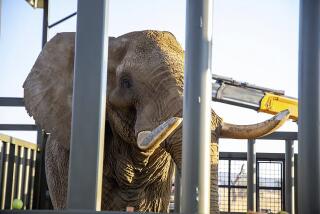African Elephant Imports Delayed
- Share via
WASHINGTON — A federal judge refused Friday to block two U.S. zoos from importing 11 African elephants but ordered that the shipments be delayed, pending a likely appeal.
Animal-rights groups had sued, arguing that the elephants should be left in the wild in Africa and not shipped to the Lowry Park Zoo in Tampa, Fla., and the San Diego Wild Animal Park.
U.S. District Judge John Bates said he rejected the injunction request because he considered it unlikely that the animal rights groups would prevail in their argument that the Fish and Wildlife Service acted improperly in issuing the permits.
But anticipating further legal action, Bates delayed the effect of his order and directed that the elephants remain at a wildlife sanctuary in Swaziland until Aug. 14. That would give animal-rights groups time to appeal his order, Bates said.
The elephant airlift had been scheduled to begin this weekend.
If the importation occurs, it would be the first time in 15 years that U.S. zoos have taken elephants from the wild and brought them to this country.
Orphaned in South Africa, the elephants were moved to Swaziland, where they have been in a government park since 1994. Zoo officials argued that the 11 animals, two of which are pregnant, were selected because they feared that otherwise the animals would be killed.
A coalition of animal-rights groups filed the lawsuit, hoping to stop the transfer because they said the Fish and Wildlife Service’s permission to import the animals for commercial purposes had violated an international treaty.
Zoo officials said that they want the elephants to promote breeding in captivity, which the animal-rights groups say isa sham.
One male and six female elephants were scheduled for delivery to the San Diego Zoo to supplement its aging elephant herd, officials said. The others, two males and two females, were destined for the Tampa zoo.
The lawsuit, filed by the Save Wild Elephants Coalition, argued that the animals were sought because young elephants “are a huge commercial draw,” and attempts to breed captive elephants has been shown to be difficult.
The group, which includes People for the Ethical Treatment of Animals, the Elephant Sanctuary and others, argued that importing the African elephants violates guidelines set by the Convention on the International Trade in Endangered Species. That document prohibits transfer of such animals for commercial purposes.
The plaintiffs argued that the elephants would be better served by being moved to one of three game reserves in South Africa and Mozambique. They filed letters with the court from officials at the game reserves indicating they would accept the elephants.
U.S. zoo officials maintained the elephants would be killed if they remain in Swaziland, where the government says the national park in which they are living is becoming overcrowded by elephants.
In May, the chief executive in charge of big game parks in Swaziland wrote the U.S. agency that the Swazi government “cannot release elephants back into the wild.”
More to Read
Sign up for Essential California
The most important California stories and recommendations in your inbox every morning.
You may occasionally receive promotional content from the Los Angeles Times.










